Analysis of Psychological Development and Diversity in Childhood
VerifiedAdded on 2023/06/05
|12
|3618
|297
Report
AI Summary
This report explores the psychological development and diversity in childhood, focusing on cultural differences in emotional, behavioral, and social characteristics. It addresses target issues within developmental psychological theory, such as the interplay of nature and nurture, the importance of cultural background, and the significance of stability and change in a child's development. The report also discusses the emergence of complex emotions like confidence and guilt, the challenges of emotional regulation, and the development of bossy behaviors in social contexts. It highlights the role of parents in fostering positive development, addressing potential behavioral disorders, and creating supportive learning environments. The report emphasizes the importance of early childhood mental health and the capacity to experience and regulate emotions for healthy social and emotional development.
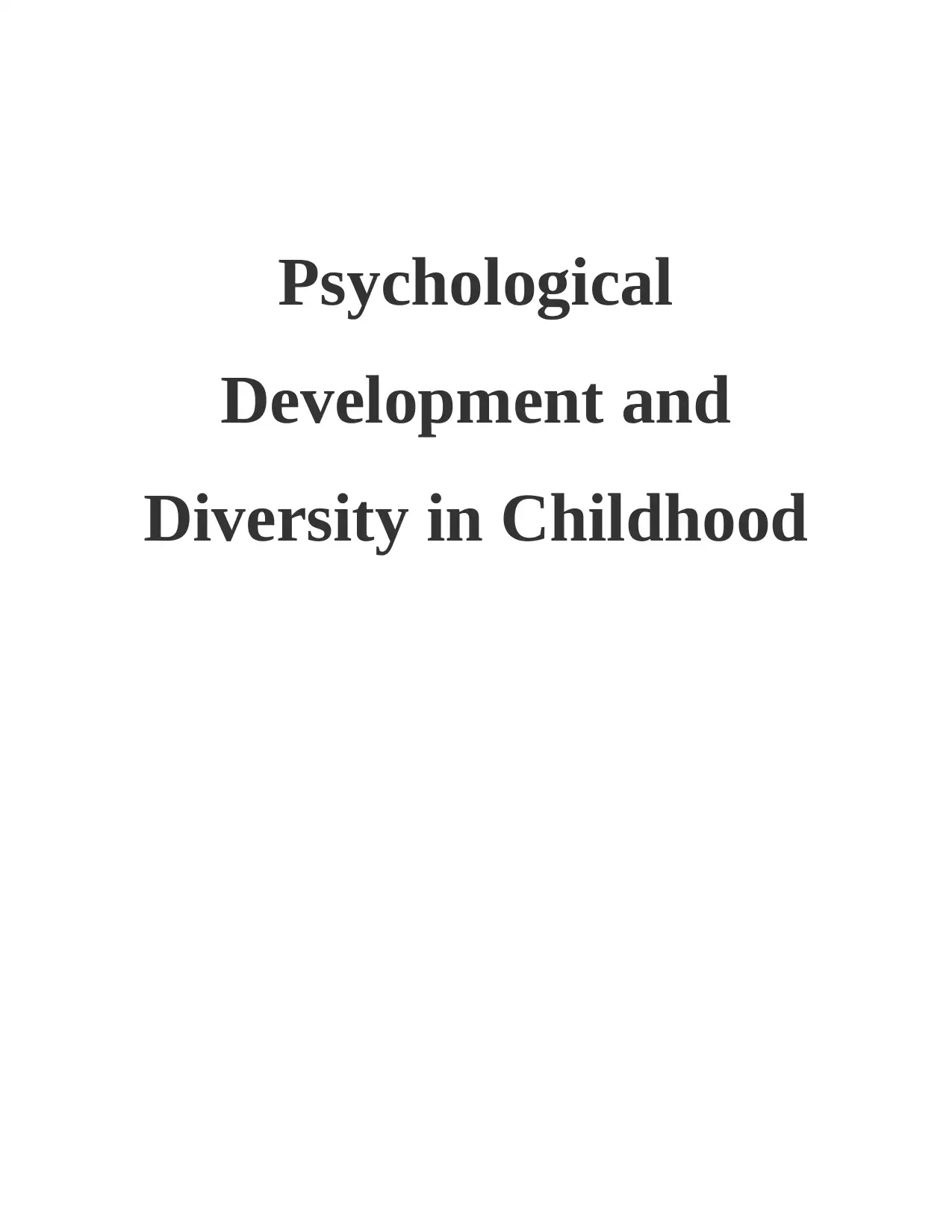
Psychological
Development and
Diversity in Childhood
Development and
Diversity in Childhood
Paraphrase This Document
Need a fresh take? Get an instant paraphrase of this document with our AI Paraphraser
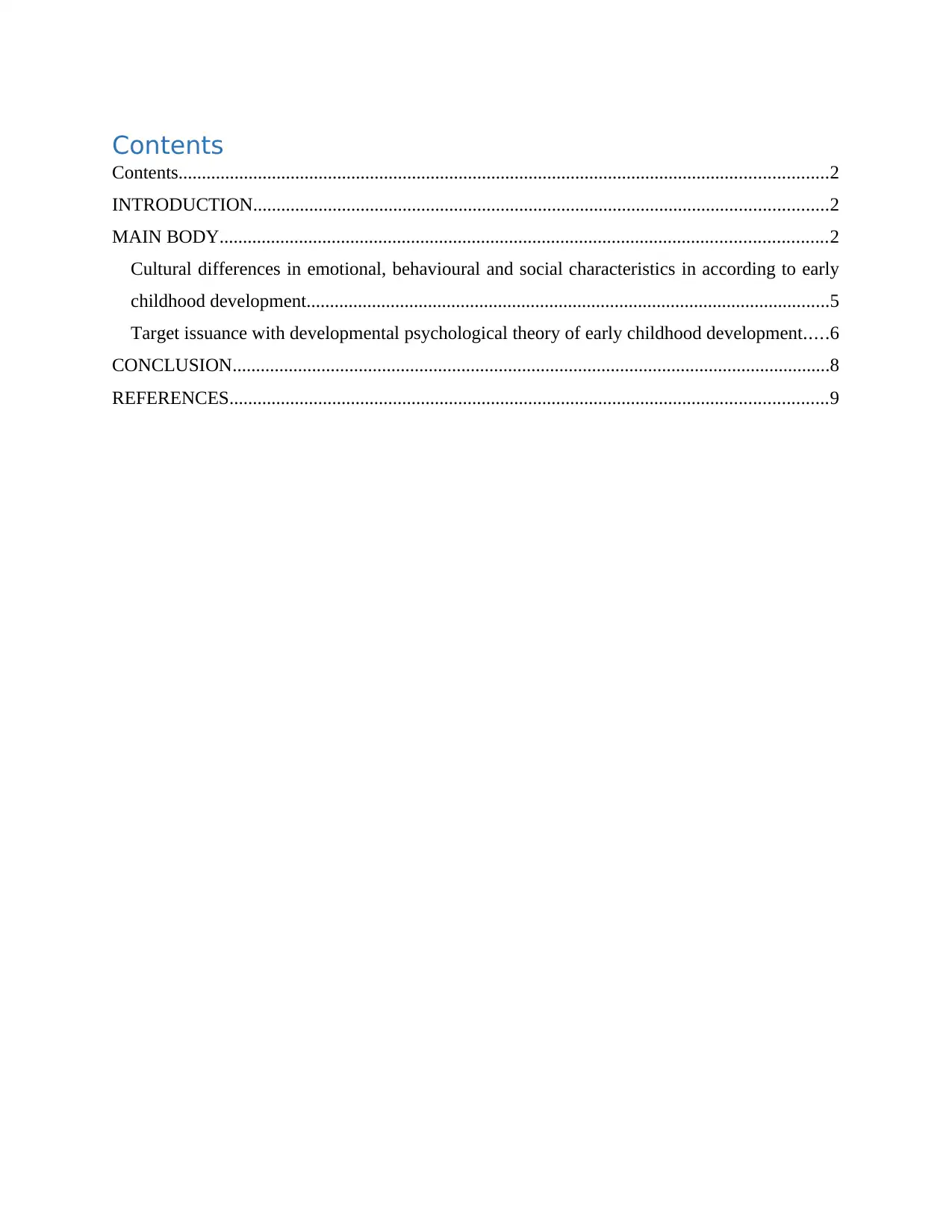
Contents
Contents...........................................................................................................................................2
INTRODUCTION...........................................................................................................................2
MAIN BODY..................................................................................................................................2
Cultural differences in emotional, behavioural and social characteristics in according to early
childhood development................................................................................................................5
Target issuance with developmental psychological theory of early childhood development.....6
CONCLUSION................................................................................................................................8
REFERENCES................................................................................................................................9
Contents...........................................................................................................................................2
INTRODUCTION...........................................................................................................................2
MAIN BODY..................................................................................................................................2
Cultural differences in emotional, behavioural and social characteristics in according to early
childhood development................................................................................................................5
Target issuance with developmental psychological theory of early childhood development.....6
CONCLUSION................................................................................................................................8
REFERENCES................................................................................................................................9
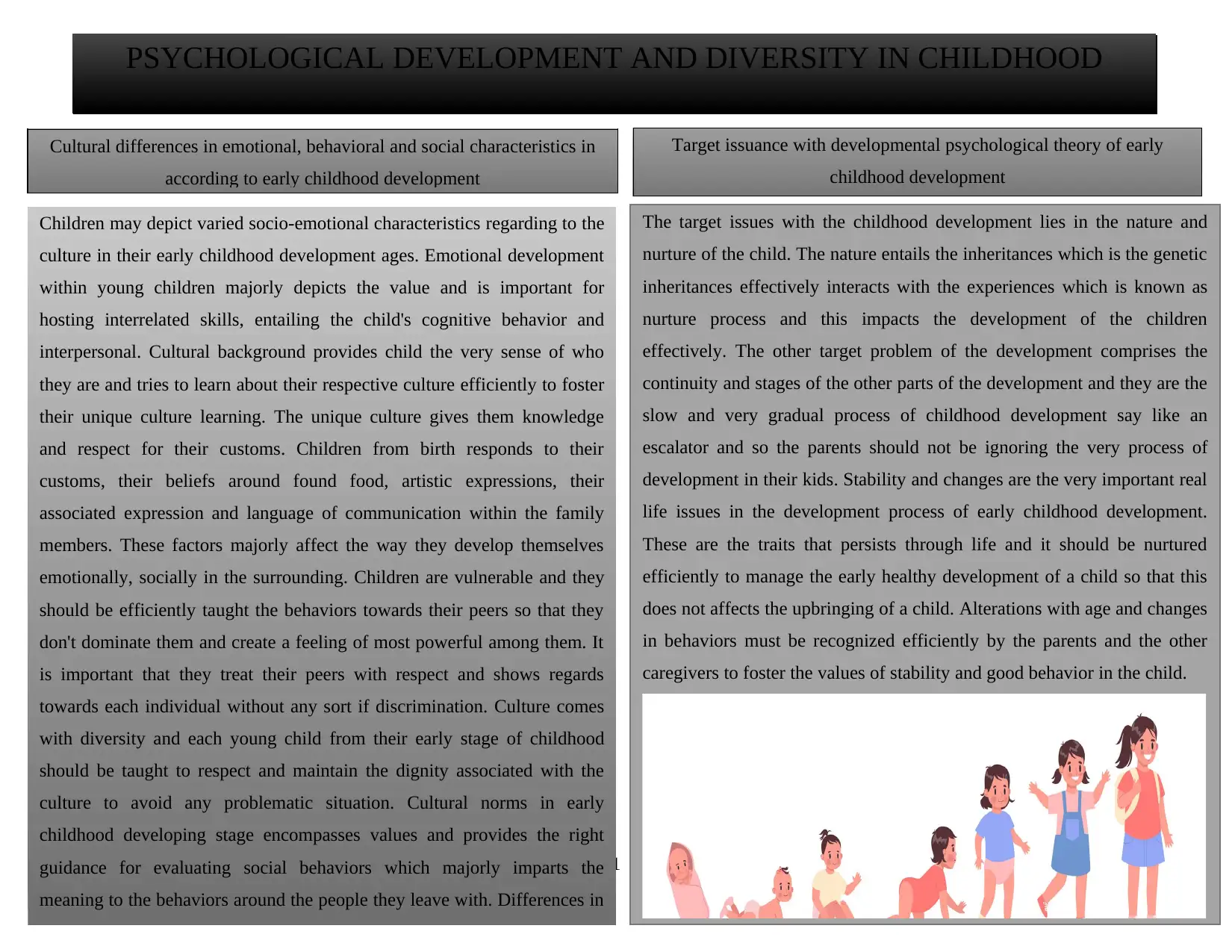
1
PSYCHOLOGICAL DEVELOPMENT AND DIVERSITY IN CHILDHOOD
Cultural differences in emotional, behavioral and social characteristics in
according to early childhood development
Target issuance with developmental psychological theory of early
childhood development
Children may depict varied socio-emotional characteristics regarding to the
culture in their early childhood development ages. Emotional development
within young children majorly depicts the value and is important for
hosting interrelated skills, entailing the child's cognitive behavior and
interpersonal. Cultural background provides child the very sense of who
they are and tries to learn about their respective culture efficiently to foster
their unique culture learning. The unique culture gives them knowledge
and respect for their customs. Children from birth responds to their
customs, their beliefs around found food, artistic expressions, their
associated expression and language of communication within the family
members. These factors majorly affect the way they develop themselves
emotionally, socially in the surrounding. Children are vulnerable and they
should be efficiently taught the behaviors towards their peers so that they
don't dominate them and create a feeling of most powerful among them. It
is important that they treat their peers with respect and shows regards
towards each individual without any sort if discrimination. Culture comes
with diversity and each young child from their early stage of childhood
should be taught to respect and maintain the dignity associated with the
culture to avoid any problematic situation. Cultural norms in early
childhood developing stage encompasses values and provides the right
guidance for evaluating social behaviors which majorly imparts the
meaning to the behaviors around the people they leave with. Differences in
cultures entails the varied societal norms with their diverse beliefs ad
The target issues with the childhood development lies in the nature and
nurture of the child. The nature entails the inheritances which is the genetic
inheritances effectively interacts with the experiences which is known as
nurture process and this impacts the development of the children
effectively. The other target problem of the development comprises the
continuity and stages of the other parts of the development and they are the
slow and very gradual process of childhood development say like an
escalator and so the parents should not be ignoring the very process of
development in their kids. Stability and changes are the very important real
life issues in the development process of early childhood development.
These are the traits that persists through life and it should be nurtured
efficiently to manage the early healthy development of a child so that this
does not affects the upbringing of a child. Alterations with age and changes
in behaviors must be recognized efficiently by the parents and the other
caregivers to foster the values of stability and good behavior in the child.
PSYCHOLOGICAL DEVELOPMENT AND DIVERSITY IN CHILDHOOD
Cultural differences in emotional, behavioral and social characteristics in
according to early childhood development
Target issuance with developmental psychological theory of early
childhood development
Children may depict varied socio-emotional characteristics regarding to the
culture in their early childhood development ages. Emotional development
within young children majorly depicts the value and is important for
hosting interrelated skills, entailing the child's cognitive behavior and
interpersonal. Cultural background provides child the very sense of who
they are and tries to learn about their respective culture efficiently to foster
their unique culture learning. The unique culture gives them knowledge
and respect for their customs. Children from birth responds to their
customs, their beliefs around found food, artistic expressions, their
associated expression and language of communication within the family
members. These factors majorly affect the way they develop themselves
emotionally, socially in the surrounding. Children are vulnerable and they
should be efficiently taught the behaviors towards their peers so that they
don't dominate them and create a feeling of most powerful among them. It
is important that they treat their peers with respect and shows regards
towards each individual without any sort if discrimination. Culture comes
with diversity and each young child from their early stage of childhood
should be taught to respect and maintain the dignity associated with the
culture to avoid any problematic situation. Cultural norms in early
childhood developing stage encompasses values and provides the right
guidance for evaluating social behaviors which majorly imparts the
meaning to the behaviors around the people they leave with. Differences in
cultures entails the varied societal norms with their diverse beliefs ad
The target issues with the childhood development lies in the nature and
nurture of the child. The nature entails the inheritances which is the genetic
inheritances effectively interacts with the experiences which is known as
nurture process and this impacts the development of the children
effectively. The other target problem of the development comprises the
continuity and stages of the other parts of the development and they are the
slow and very gradual process of childhood development say like an
escalator and so the parents should not be ignoring the very process of
development in their kids. Stability and changes are the very important real
life issues in the development process of early childhood development.
These are the traits that persists through life and it should be nurtured
efficiently to manage the early healthy development of a child so that this
does not affects the upbringing of a child. Alterations with age and changes
in behaviors must be recognized efficiently by the parents and the other
caregivers to foster the values of stability and good behavior in the child.
⊘ This is a preview!⊘
Do you want full access?
Subscribe today to unlock all pages.

Trusted by 1+ million students worldwide
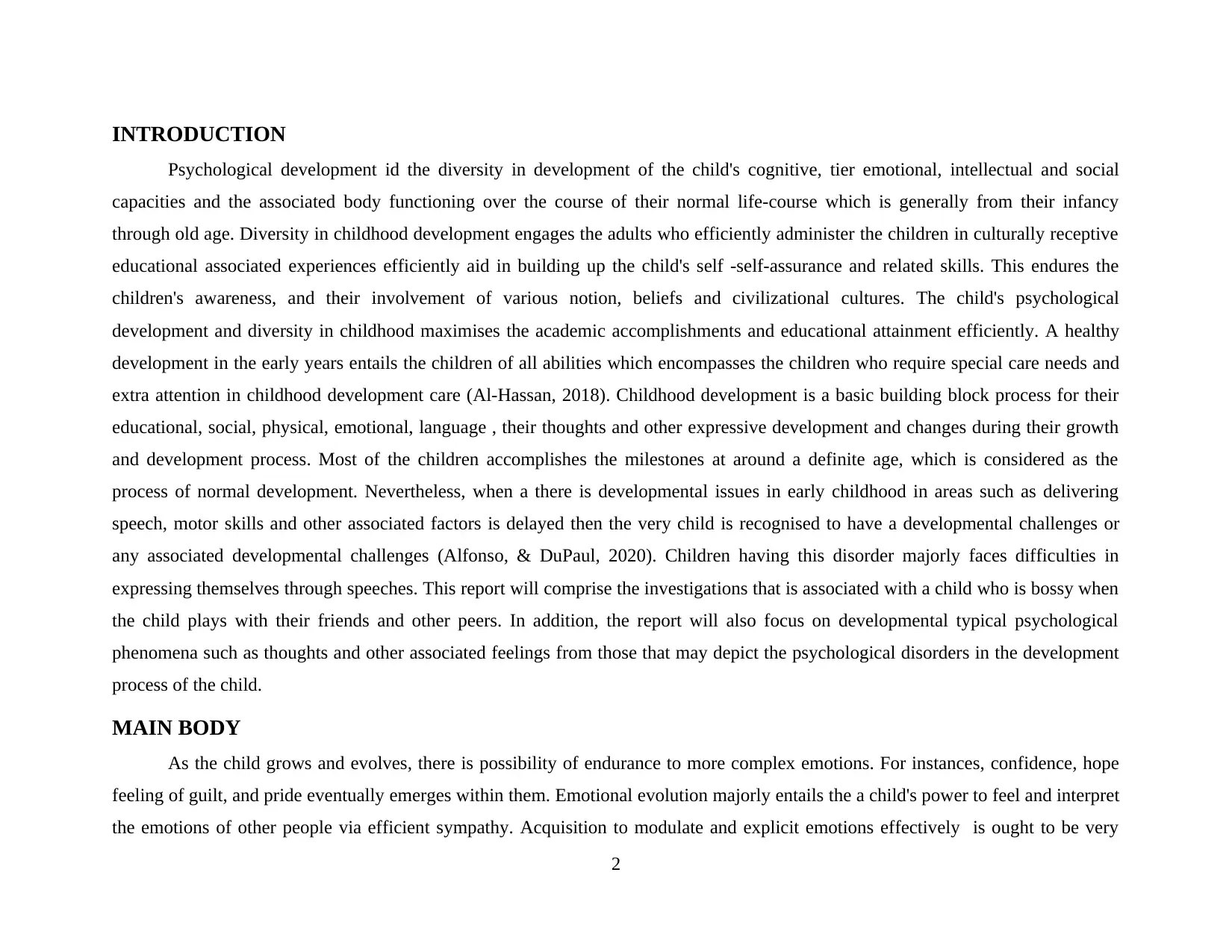
INTRODUCTION
Psychological development id the diversity in development of the child's cognitive, tier emotional, intellectual and social
capacities and the associated body functioning over the course of their normal life-course which is generally from their infancy
through old age. Diversity in childhood development engages the adults who efficiently administer the children in culturally receptive
educational associated experiences efficiently aid in building up the child's self -self-assurance and related skills. This endures the
children's awareness, and their involvement of various notion, beliefs and civilizational cultures. The child's psychological
development and diversity in childhood maximises the academic accomplishments and educational attainment efficiently. A healthy
development in the early years entails the children of all abilities which encompasses the children who require special care needs and
extra attention in childhood development care (Al-Hassan, 2018). Childhood development is a basic building block process for their
educational, social, physical, emotional, language , their thoughts and other expressive development and changes during their growth
and development process. Most of the children accomplishes the milestones at around a definite age, which is considered as the
process of normal development. Nevertheless, when a there is developmental issues in early childhood in areas such as delivering
speech, motor skills and other associated factors is delayed then the very child is recognised to have a developmental challenges or
any associated developmental challenges (Alfonso, & DuPaul, 2020). Children having this disorder majorly faces difficulties in
expressing themselves through speeches. This report will comprise the investigations that is associated with a child who is bossy when
the child plays with their friends and other peers. In addition, the report will also focus on developmental typical psychological
phenomena such as thoughts and other associated feelings from those that may depict the psychological disorders in the development
process of the child.
MAIN BODY
As the child grows and evolves, there is possibility of endurance to more complex emotions. For instances, confidence, hope
feeling of guilt, and pride eventually emerges within them. Emotional evolution majorly entails the a child's power to feel and interpret
the emotions of other people via efficient sympathy. Acquisition to modulate and explicit emotions effectively is ought to be very
2
Psychological development id the diversity in development of the child's cognitive, tier emotional, intellectual and social
capacities and the associated body functioning over the course of their normal life-course which is generally from their infancy
through old age. Diversity in childhood development engages the adults who efficiently administer the children in culturally receptive
educational associated experiences efficiently aid in building up the child's self -self-assurance and related skills. This endures the
children's awareness, and their involvement of various notion, beliefs and civilizational cultures. The child's psychological
development and diversity in childhood maximises the academic accomplishments and educational attainment efficiently. A healthy
development in the early years entails the children of all abilities which encompasses the children who require special care needs and
extra attention in childhood development care (Al-Hassan, 2018). Childhood development is a basic building block process for their
educational, social, physical, emotional, language , their thoughts and other expressive development and changes during their growth
and development process. Most of the children accomplishes the milestones at around a definite age, which is considered as the
process of normal development. Nevertheless, when a there is developmental issues in early childhood in areas such as delivering
speech, motor skills and other associated factors is delayed then the very child is recognised to have a developmental challenges or
any associated developmental challenges (Alfonso, & DuPaul, 2020). Children having this disorder majorly faces difficulties in
expressing themselves through speeches. This report will comprise the investigations that is associated with a child who is bossy when
the child plays with their friends and other peers. In addition, the report will also focus on developmental typical psychological
phenomena such as thoughts and other associated feelings from those that may depict the psychological disorders in the development
process of the child.
MAIN BODY
As the child grows and evolves, there is possibility of endurance to more complex emotions. For instances, confidence, hope
feeling of guilt, and pride eventually emerges within them. Emotional evolution majorly entails the a child's power to feel and interpret
the emotions of other people via efficient sympathy. Acquisition to modulate and explicit emotions effectively is ought to be very
2
Paraphrase This Document
Need a fresh take? Get an instant paraphrase of this document with our AI Paraphraser
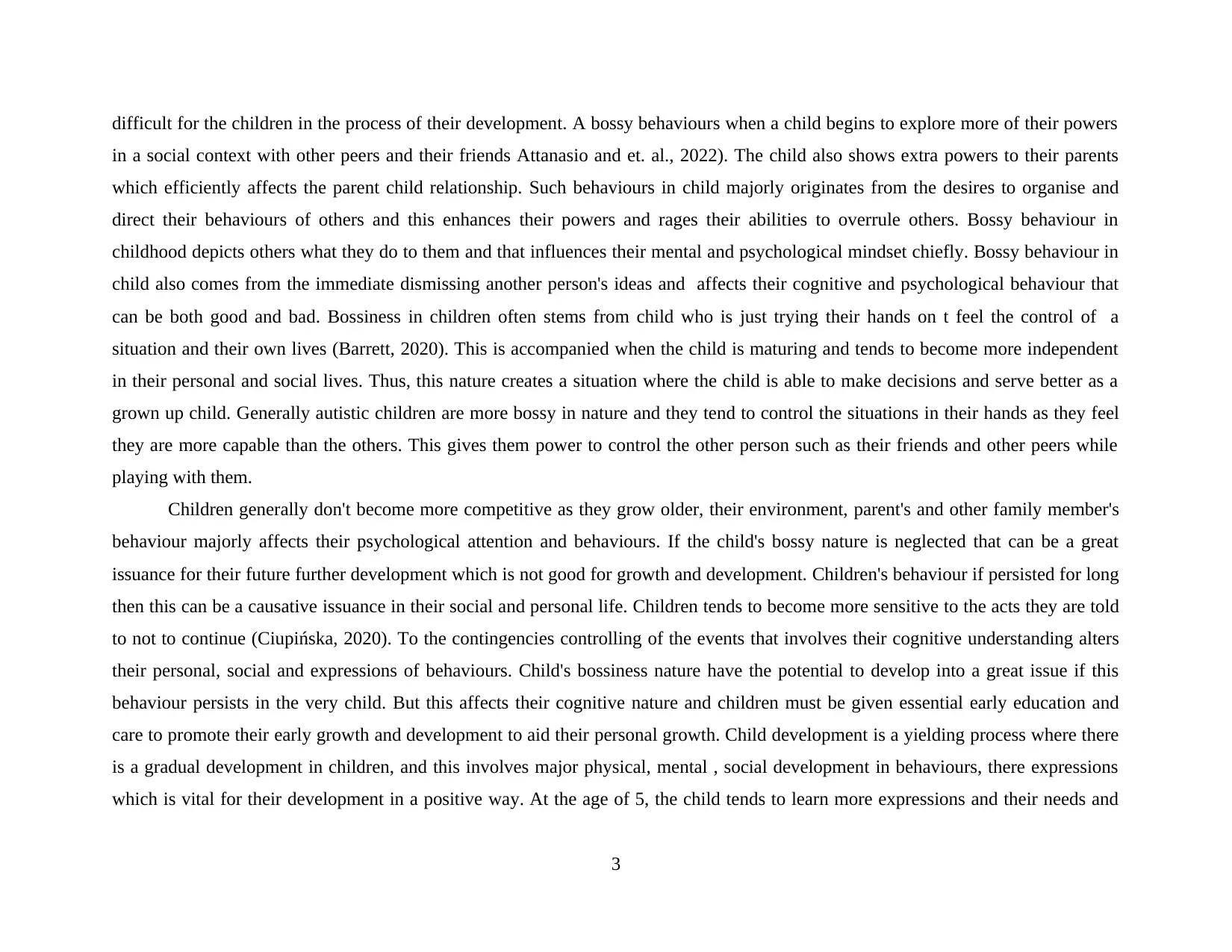
difficult for the children in the process of their development. A bossy behaviours when a child begins to explore more of their powers
in a social context with other peers and their friends Attanasio and et. al., 2022). The child also shows extra powers to their parents
which efficiently affects the parent child relationship. Such behaviours in child majorly originates from the desires to organise and
direct their behaviours of others and this enhances their powers and rages their abilities to overrule others. Bossy behaviour in
childhood depicts others what they do to them and that influences their mental and psychological mindset chiefly. Bossy behaviour in
child also comes from the immediate dismissing another person's ideas and affects their cognitive and psychological behaviour that
can be both good and bad. Bossiness in children often stems from child who is just trying their hands on t feel the control of a
situation and their own lives (Barrett, 2020). This is accompanied when the child is maturing and tends to become more independent
in their personal and social lives. Thus, this nature creates a situation where the child is able to make decisions and serve better as a
grown up child. Generally autistic children are more bossy in nature and they tend to control the situations in their hands as they feel
they are more capable than the others. This gives them power to control the other person such as their friends and other peers while
playing with them.
Children generally don't become more competitive as they grow older, their environment, parent's and other family member's
behaviour majorly affects their psychological attention and behaviours. If the child's bossy nature is neglected that can be a great
issuance for their future further development which is not good for growth and development. Children's behaviour if persisted for long
then this can be a causative issuance in their social and personal life. Children tends to become more sensitive to the acts they are told
to not to continue (Ciupińska, 2020). To the contingencies controlling of the events that involves their cognitive understanding alters
their personal, social and expressions of behaviours. Child's bossiness nature have the potential to develop into a great issue if this
behaviour persists in the very child. But this affects their cognitive nature and children must be given essential early education and
care to promote their early growth and development to aid their personal growth. Child development is a yielding process where there
is a gradual development in children, and this involves major physical, mental , social development in behaviours, there expressions
which is vital for their development in a positive way. At the age of 5, the child tends to learn more expressions and their needs and
3
in a social context with other peers and their friends Attanasio and et. al., 2022). The child also shows extra powers to their parents
which efficiently affects the parent child relationship. Such behaviours in child majorly originates from the desires to organise and
direct their behaviours of others and this enhances their powers and rages their abilities to overrule others. Bossy behaviour in
childhood depicts others what they do to them and that influences their mental and psychological mindset chiefly. Bossy behaviour in
child also comes from the immediate dismissing another person's ideas and affects their cognitive and psychological behaviour that
can be both good and bad. Bossiness in children often stems from child who is just trying their hands on t feel the control of a
situation and their own lives (Barrett, 2020). This is accompanied when the child is maturing and tends to become more independent
in their personal and social lives. Thus, this nature creates a situation where the child is able to make decisions and serve better as a
grown up child. Generally autistic children are more bossy in nature and they tend to control the situations in their hands as they feel
they are more capable than the others. This gives them power to control the other person such as their friends and other peers while
playing with them.
Children generally don't become more competitive as they grow older, their environment, parent's and other family member's
behaviour majorly affects their psychological attention and behaviours. If the child's bossy nature is neglected that can be a great
issuance for their future further development which is not good for growth and development. Children's behaviour if persisted for long
then this can be a causative issuance in their social and personal life. Children tends to become more sensitive to the acts they are told
to not to continue (Ciupińska, 2020). To the contingencies controlling of the events that involves their cognitive understanding alters
their personal, social and expressions of behaviours. Child's bossiness nature have the potential to develop into a great issue if this
behaviour persists in the very child. But this affects their cognitive nature and children must be given essential early education and
care to promote their early growth and development to aid their personal growth. Child development is a yielding process where there
is a gradual development in children, and this involves major physical, mental , social development in behaviours, there expressions
which is vital for their development in a positive way. At the age of 5, the child tends to learn more expressions and their needs and
3
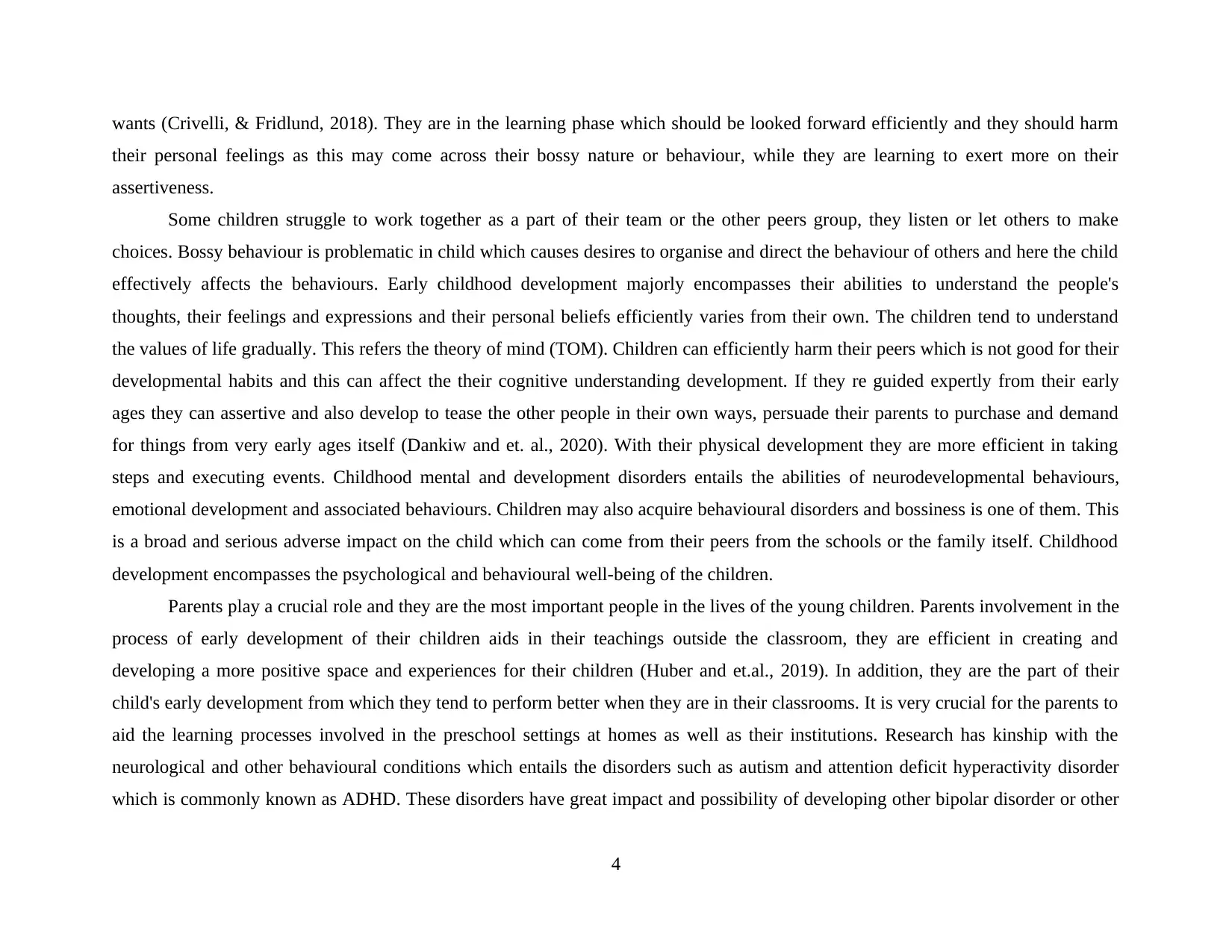
wants (Crivelli, & Fridlund, 2018). They are in the learning phase which should be looked forward efficiently and they should harm
their personal feelings as this may come across their bossy nature or behaviour, while they are learning to exert more on their
assertiveness.
Some children struggle to work together as a part of their team or the other peers group, they listen or let others to make
choices. Bossy behaviour is problematic in child which causes desires to organise and direct the behaviour of others and here the child
effectively affects the behaviours. Early childhood development majorly encompasses their abilities to understand the people's
thoughts, their feelings and expressions and their personal beliefs efficiently varies from their own. The children tend to understand
the values of life gradually. This refers the theory of mind (TOM). Children can efficiently harm their peers which is not good for their
developmental habits and this can affect the their cognitive understanding development. If they re guided expertly from their early
ages they can assertive and also develop to tease the other people in their own ways, persuade their parents to purchase and demand
for things from very early ages itself (Dankiw and et. al., 2020). With their physical development they are more efficient in taking
steps and executing events. Childhood mental and development disorders entails the abilities of neurodevelopmental behaviours,
emotional development and associated behaviours. Children may also acquire behavioural disorders and bossiness is one of them. This
is a broad and serious adverse impact on the child which can come from their peers from the schools or the family itself. Childhood
development encompasses the psychological and behavioural well-being of the children.
Parents play a crucial role and they are the most important people in the lives of the young children. Parents involvement in the
process of early development of their children aids in their teachings outside the classroom, they are efficient in creating and
developing a more positive space and experiences for their children (Huber and et.al., 2019). In addition, they are the part of their
child's early development from which they tend to perform better when they are in their classrooms. It is very crucial for the parents to
aid the learning processes involved in the preschool settings at homes as well as their institutions. Research has kinship with the
neurological and other behavioural conditions which entails the disorders such as autism and attention deficit hyperactivity disorder
which is commonly known as ADHD. These disorders have great impact and possibility of developing other bipolar disorder or other
4
their personal feelings as this may come across their bossy nature or behaviour, while they are learning to exert more on their
assertiveness.
Some children struggle to work together as a part of their team or the other peers group, they listen or let others to make
choices. Bossy behaviour is problematic in child which causes desires to organise and direct the behaviour of others and here the child
effectively affects the behaviours. Early childhood development majorly encompasses their abilities to understand the people's
thoughts, their feelings and expressions and their personal beliefs efficiently varies from their own. The children tend to understand
the values of life gradually. This refers the theory of mind (TOM). Children can efficiently harm their peers which is not good for their
developmental habits and this can affect the their cognitive understanding development. If they re guided expertly from their early
ages they can assertive and also develop to tease the other people in their own ways, persuade their parents to purchase and demand
for things from very early ages itself (Dankiw and et. al., 2020). With their physical development they are more efficient in taking
steps and executing events. Childhood mental and development disorders entails the abilities of neurodevelopmental behaviours,
emotional development and associated behaviours. Children may also acquire behavioural disorders and bossiness is one of them. This
is a broad and serious adverse impact on the child which can come from their peers from the schools or the family itself. Childhood
development encompasses the psychological and behavioural well-being of the children.
Parents play a crucial role and they are the most important people in the lives of the young children. Parents involvement in the
process of early development of their children aids in their teachings outside the classroom, they are efficient in creating and
developing a more positive space and experiences for their children (Huber and et.al., 2019). In addition, they are the part of their
child's early development from which they tend to perform better when they are in their classrooms. It is very crucial for the parents to
aid the learning processes involved in the preschool settings at homes as well as their institutions. Research has kinship with the
neurological and other behavioural conditions which entails the disorders such as autism and attention deficit hyperactivity disorder
which is commonly known as ADHD. These disorders have great impact and possibility of developing other bipolar disorder or other
4
⊘ This is a preview!⊘
Do you want full access?
Subscribe today to unlock all pages.

Trusted by 1+ million students worldwide
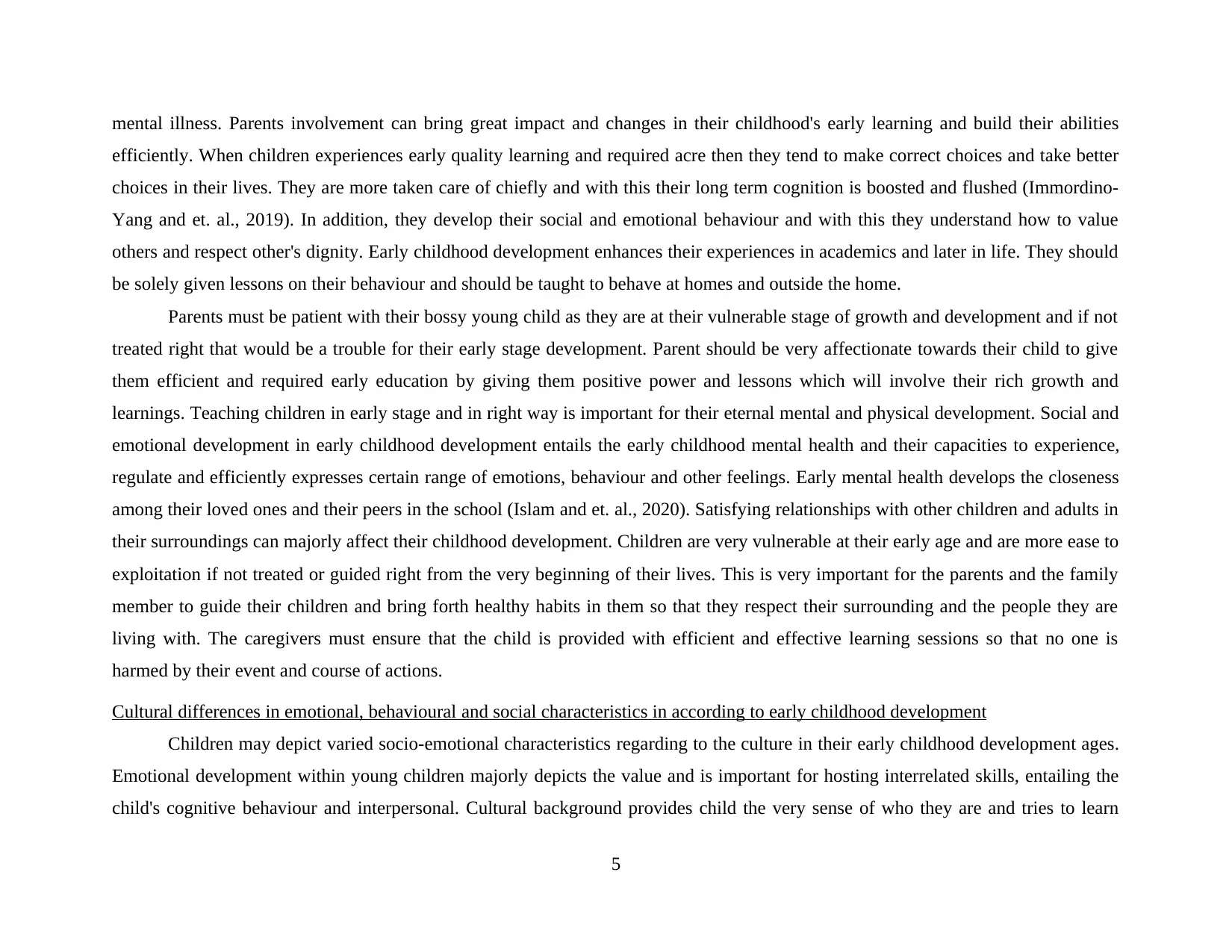
mental illness. Parents involvement can bring great impact and changes in their childhood's early learning and build their abilities
efficiently. When children experiences early quality learning and required acre then they tend to make correct choices and take better
choices in their lives. They are more taken care of chiefly and with this their long term cognition is boosted and flushed (Immordino-
Yang and et. al., 2019). In addition, they develop their social and emotional behaviour and with this they understand how to value
others and respect other's dignity. Early childhood development enhances their experiences in academics and later in life. They should
be solely given lessons on their behaviour and should be taught to behave at homes and outside the home.
Parents must be patient with their bossy young child as they are at their vulnerable stage of growth and development and if not
treated right that would be a trouble for their early stage development. Parent should be very affectionate towards their child to give
them efficient and required early education by giving them positive power and lessons which will involve their rich growth and
learnings. Teaching children in early stage and in right way is important for their eternal mental and physical development. Social and
emotional development in early childhood development entails the early childhood mental health and their capacities to experience,
regulate and efficiently expresses certain range of emotions, behaviour and other feelings. Early mental health develops the closeness
among their loved ones and their peers in the school (Islam and et. al., 2020). Satisfying relationships with other children and adults in
their surroundings can majorly affect their childhood development. Children are very vulnerable at their early age and are more ease to
exploitation if not treated or guided right from the very beginning of their lives. This is very important for the parents and the family
member to guide their children and bring forth healthy habits in them so that they respect their surrounding and the people they are
living with. The caregivers must ensure that the child is provided with efficient and effective learning sessions so that no one is
harmed by their event and course of actions.
Cultural differences in emotional, behavioural and social characteristics in according to early childhood development
Children may depict varied socio-emotional characteristics regarding to the culture in their early childhood development ages.
Emotional development within young children majorly depicts the value and is important for hosting interrelated skills, entailing the
child's cognitive behaviour and interpersonal. Cultural background provides child the very sense of who they are and tries to learn
5
efficiently. When children experiences early quality learning and required acre then they tend to make correct choices and take better
choices in their lives. They are more taken care of chiefly and with this their long term cognition is boosted and flushed (Immordino-
Yang and et. al., 2019). In addition, they develop their social and emotional behaviour and with this they understand how to value
others and respect other's dignity. Early childhood development enhances their experiences in academics and later in life. They should
be solely given lessons on their behaviour and should be taught to behave at homes and outside the home.
Parents must be patient with their bossy young child as they are at their vulnerable stage of growth and development and if not
treated right that would be a trouble for their early stage development. Parent should be very affectionate towards their child to give
them efficient and required early education by giving them positive power and lessons which will involve their rich growth and
learnings. Teaching children in early stage and in right way is important for their eternal mental and physical development. Social and
emotional development in early childhood development entails the early childhood mental health and their capacities to experience,
regulate and efficiently expresses certain range of emotions, behaviour and other feelings. Early mental health develops the closeness
among their loved ones and their peers in the school (Islam and et. al., 2020). Satisfying relationships with other children and adults in
their surroundings can majorly affect their childhood development. Children are very vulnerable at their early age and are more ease to
exploitation if not treated or guided right from the very beginning of their lives. This is very important for the parents and the family
member to guide their children and bring forth healthy habits in them so that they respect their surrounding and the people they are
living with. The caregivers must ensure that the child is provided with efficient and effective learning sessions so that no one is
harmed by their event and course of actions.
Cultural differences in emotional, behavioural and social characteristics in according to early childhood development
Children may depict varied socio-emotional characteristics regarding to the culture in their early childhood development ages.
Emotional development within young children majorly depicts the value and is important for hosting interrelated skills, entailing the
child's cognitive behaviour and interpersonal. Cultural background provides child the very sense of who they are and tries to learn
5
Paraphrase This Document
Need a fresh take? Get an instant paraphrase of this document with our AI Paraphraser
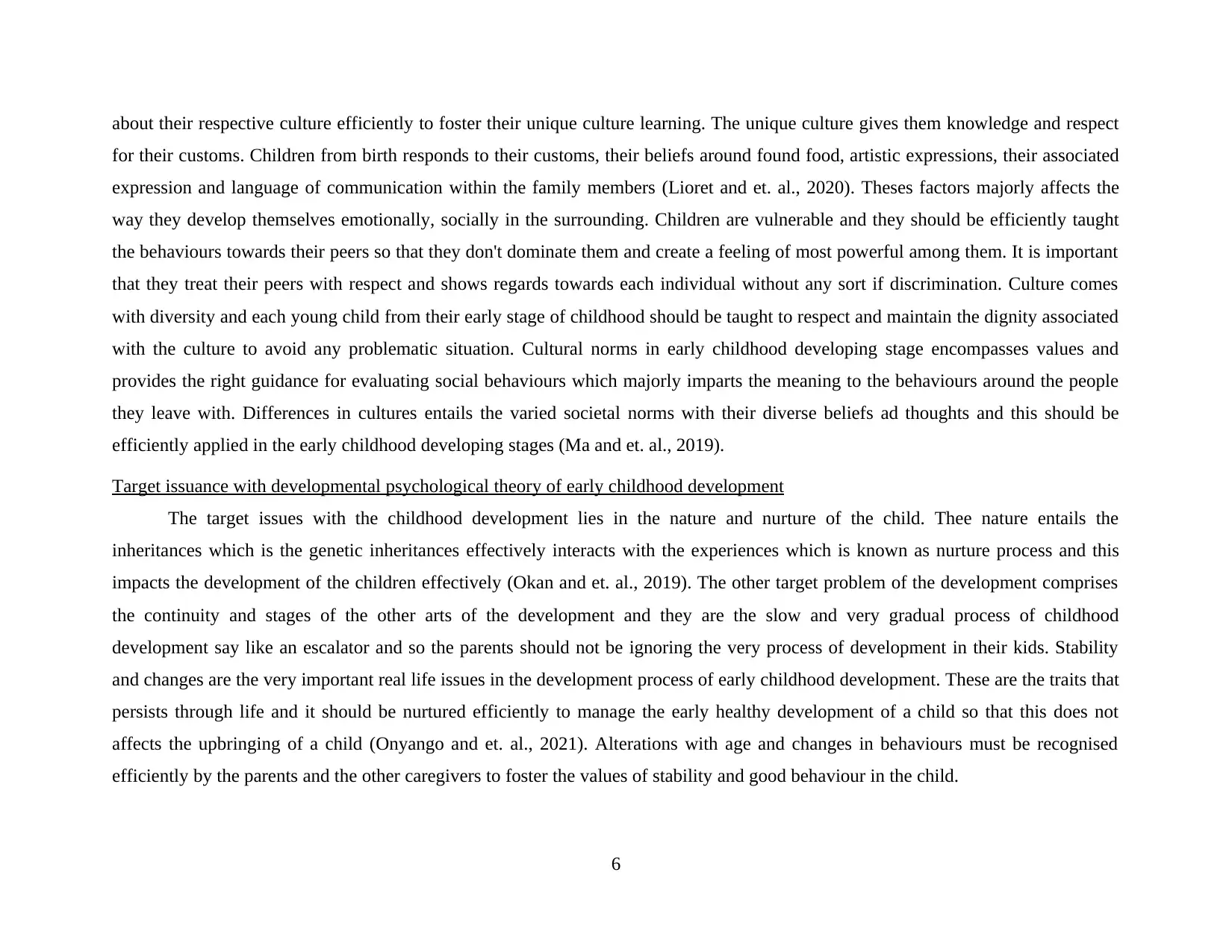
about their respective culture efficiently to foster their unique culture learning. The unique culture gives them knowledge and respect
for their customs. Children from birth responds to their customs, their beliefs around found food, artistic expressions, their associated
expression and language of communication within the family members (Lioret and et. al., 2020). Theses factors majorly affects the
way they develop themselves emotionally, socially in the surrounding. Children are vulnerable and they should be efficiently taught
the behaviours towards their peers so that they don't dominate them and create a feeling of most powerful among them. It is important
that they treat their peers with respect and shows regards towards each individual without any sort if discrimination. Culture comes
with diversity and each young child from their early stage of childhood should be taught to respect and maintain the dignity associated
with the culture to avoid any problematic situation. Cultural norms in early childhood developing stage encompasses values and
provides the right guidance for evaluating social behaviours which majorly imparts the meaning to the behaviours around the people
they leave with. Differences in cultures entails the varied societal norms with their diverse beliefs ad thoughts and this should be
efficiently applied in the early childhood developing stages (Ma and et. al., 2019).
Target issuance with developmental psychological theory of early childhood development
The target issues with the childhood development lies in the nature and nurture of the child. Thee nature entails the
inheritances which is the genetic inheritances effectively interacts with the experiences which is known as nurture process and this
impacts the development of the children effectively (Okan and et. al., 2019). The other target problem of the development comprises
the continuity and stages of the other arts of the development and they are the slow and very gradual process of childhood
development say like an escalator and so the parents should not be ignoring the very process of development in their kids. Stability
and changes are the very important real life issues in the development process of early childhood development. These are the traits that
persists through life and it should be nurtured efficiently to manage the early healthy development of a child so that this does not
affects the upbringing of a child (Onyango and et. al., 2021). Alterations with age and changes in behaviours must be recognised
efficiently by the parents and the other caregivers to foster the values of stability and good behaviour in the child.
6
for their customs. Children from birth responds to their customs, their beliefs around found food, artistic expressions, their associated
expression and language of communication within the family members (Lioret and et. al., 2020). Theses factors majorly affects the
way they develop themselves emotionally, socially in the surrounding. Children are vulnerable and they should be efficiently taught
the behaviours towards their peers so that they don't dominate them and create a feeling of most powerful among them. It is important
that they treat their peers with respect and shows regards towards each individual without any sort if discrimination. Culture comes
with diversity and each young child from their early stage of childhood should be taught to respect and maintain the dignity associated
with the culture to avoid any problematic situation. Cultural norms in early childhood developing stage encompasses values and
provides the right guidance for evaluating social behaviours which majorly imparts the meaning to the behaviours around the people
they leave with. Differences in cultures entails the varied societal norms with their diverse beliefs ad thoughts and this should be
efficiently applied in the early childhood developing stages (Ma and et. al., 2019).
Target issuance with developmental psychological theory of early childhood development
The target issues with the childhood development lies in the nature and nurture of the child. Thee nature entails the
inheritances which is the genetic inheritances effectively interacts with the experiences which is known as nurture process and this
impacts the development of the children effectively (Okan and et. al., 2019). The other target problem of the development comprises
the continuity and stages of the other arts of the development and they are the slow and very gradual process of childhood
development say like an escalator and so the parents should not be ignoring the very process of development in their kids. Stability
and changes are the very important real life issues in the development process of early childhood development. These are the traits that
persists through life and it should be nurtured efficiently to manage the early healthy development of a child so that this does not
affects the upbringing of a child (Onyango and et. al., 2021). Alterations with age and changes in behaviours must be recognised
efficiently by the parents and the other caregivers to foster the values of stability and good behaviour in the child.
6

7
⊘ This is a preview!⊘
Do you want full access?
Subscribe today to unlock all pages.

Trusted by 1+ million students worldwide
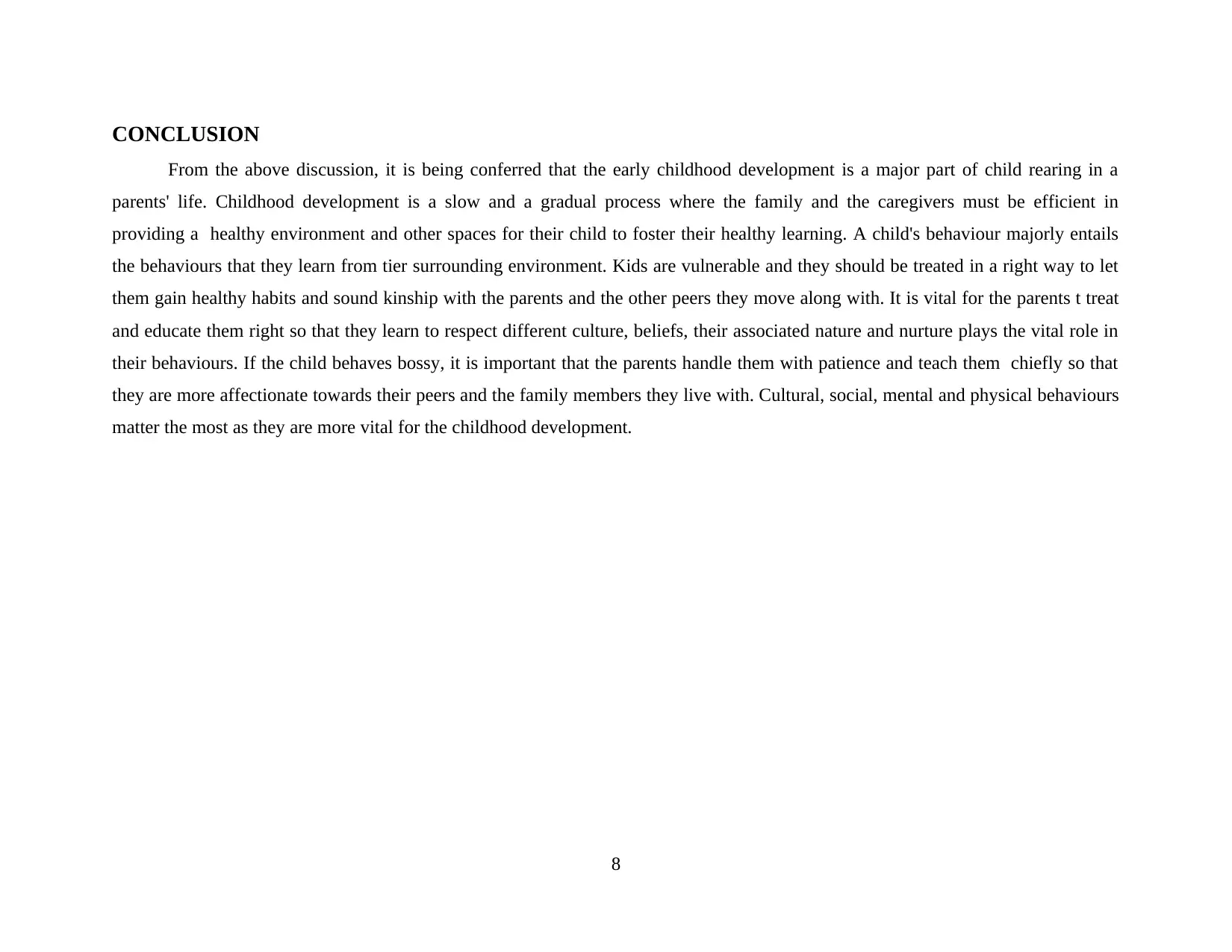
CONCLUSION
From the above discussion, it is being conferred that the early childhood development is a major part of child rearing in a
parents' life. Childhood development is a slow and a gradual process where the family and the caregivers must be efficient in
providing a healthy environment and other spaces for their child to foster their healthy learning. A child's behaviour majorly entails
the behaviours that they learn from tier surrounding environment. Kids are vulnerable and they should be treated in a right way to let
them gain healthy habits and sound kinship with the parents and the other peers they move along with. It is vital for the parents t treat
and educate them right so that they learn to respect different culture, beliefs, their associated nature and nurture plays the vital role in
their behaviours. If the child behaves bossy, it is important that the parents handle them with patience and teach them chiefly so that
they are more affectionate towards their peers and the family members they live with. Cultural, social, mental and physical behaviours
matter the most as they are more vital for the childhood development.
8
From the above discussion, it is being conferred that the early childhood development is a major part of child rearing in a
parents' life. Childhood development is a slow and a gradual process where the family and the caregivers must be efficient in
providing a healthy environment and other spaces for their child to foster their healthy learning. A child's behaviour majorly entails
the behaviours that they learn from tier surrounding environment. Kids are vulnerable and they should be treated in a right way to let
them gain healthy habits and sound kinship with the parents and the other peers they move along with. It is vital for the parents t treat
and educate them right so that they learn to respect different culture, beliefs, their associated nature and nurture plays the vital role in
their behaviours. If the child behaves bossy, it is important that the parents handle them with patience and teach them chiefly so that
they are more affectionate towards their peers and the family members they live with. Cultural, social, mental and physical behaviours
matter the most as they are more vital for the childhood development.
8
Paraphrase This Document
Need a fresh take? Get an instant paraphrase of this document with our AI Paraphraser
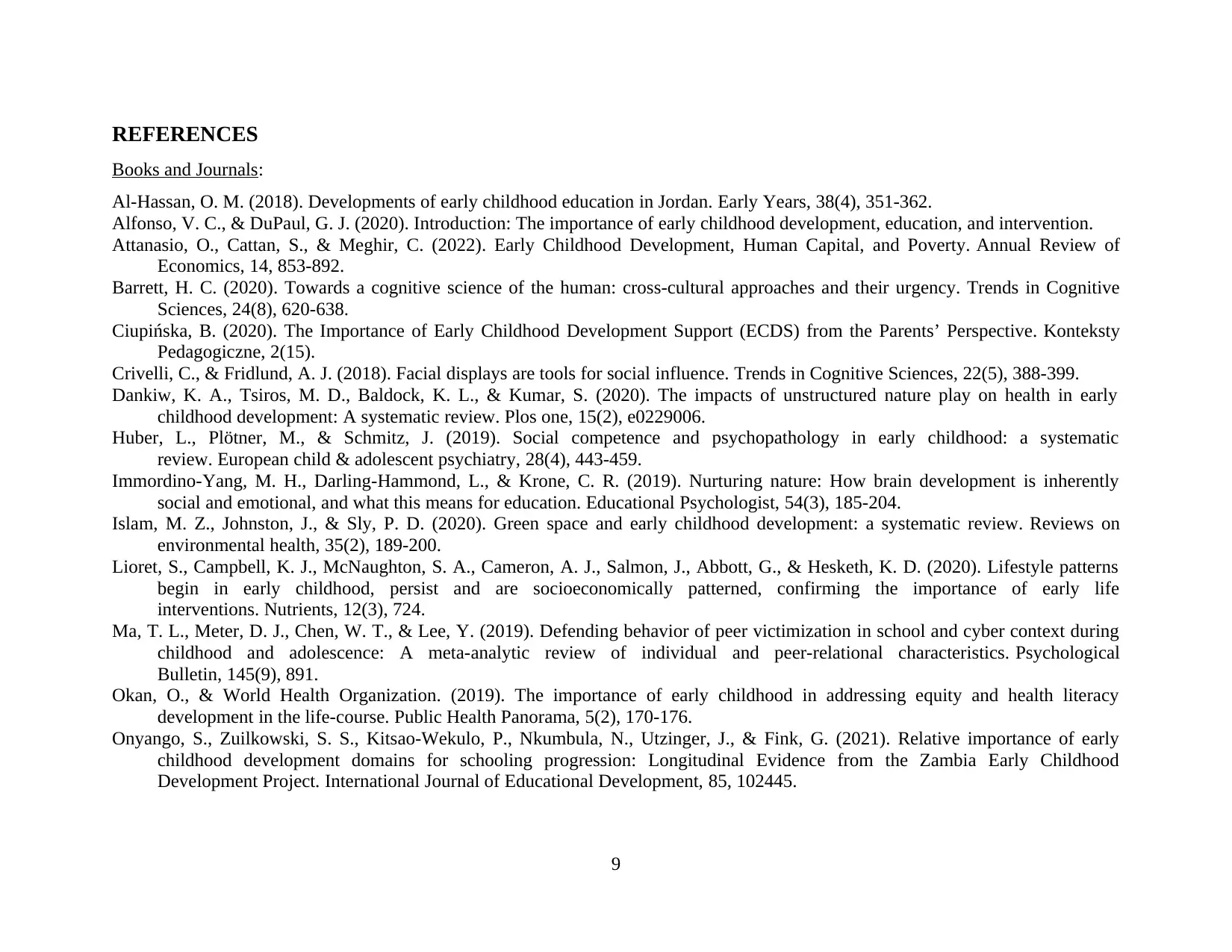
REFERENCES
Books and Journals:
Al-Hassan, O. M. (2018). Developments of early childhood education in Jordan. Early Years, 38(4), 351-362.
Alfonso, V. C., & DuPaul, G. J. (2020). Introduction: The importance of early childhood development, education, and intervention.
Attanasio, O., Cattan, S., & Meghir, C. (2022). Early Childhood Development, Human Capital, and Poverty. Annual Review of
Economics, 14, 853-892.
Barrett, H. C. (2020). Towards a cognitive science of the human: cross-cultural approaches and their urgency. Trends in Cognitive
Sciences, 24(8), 620-638.
Ciupińska, B. (2020). The Importance of Early Childhood Development Support (ECDS) from the Parents’ Perspective. Konteksty
Pedagogiczne, 2(15).
Crivelli, C., & Fridlund, A. J. (2018). Facial displays are tools for social influence. Trends in Cognitive Sciences, 22(5), 388-399.
Dankiw, K. A., Tsiros, M. D., Baldock, K. L., & Kumar, S. (2020). The impacts of unstructured nature play on health in early
childhood development: A systematic review. Plos one, 15(2), e0229006.
Huber, L., Plötner, M., & Schmitz, J. (2019). Social competence and psychopathology in early childhood: a systematic
review. European child & adolescent psychiatry, 28(4), 443-459.
Immordino-Yang, M. H., Darling-Hammond, L., & Krone, C. R. (2019). Nurturing nature: How brain development is inherently
social and emotional, and what this means for education. Educational Psychologist, 54(3), 185-204.
Islam, M. Z., Johnston, J., & Sly, P. D. (2020). Green space and early childhood development: a systematic review. Reviews on
environmental health, 35(2), 189-200.
Lioret, S., Campbell, K. J., McNaughton, S. A., Cameron, A. J., Salmon, J., Abbott, G., & Hesketh, K. D. (2020). Lifestyle patterns
begin in early childhood, persist and are socioeconomically patterned, confirming the importance of early life
interventions. Nutrients, 12(3), 724.
Ma, T. L., Meter, D. J., Chen, W. T., & Lee, Y. (2019). Defending behavior of peer victimization in school and cyber context during
childhood and adolescence: A meta-analytic review of individual and peer-relational characteristics. Psychological
Bulletin, 145(9), 891.
Okan, O., & World Health Organization. (2019). The importance of early childhood in addressing equity and health literacy
development in the life-course. Public Health Panorama, 5(2), 170-176.
Onyango, S., Zuilkowski, S. S., Kitsao-Wekulo, P., Nkumbula, N., Utzinger, J., & Fink, G. (2021). Relative importance of early
childhood development domains for schooling progression: Longitudinal Evidence from the Zambia Early Childhood
Development Project. International Journal of Educational Development, 85, 102445.
9
Books and Journals:
Al-Hassan, O. M. (2018). Developments of early childhood education in Jordan. Early Years, 38(4), 351-362.
Alfonso, V. C., & DuPaul, G. J. (2020). Introduction: The importance of early childhood development, education, and intervention.
Attanasio, O., Cattan, S., & Meghir, C. (2022). Early Childhood Development, Human Capital, and Poverty. Annual Review of
Economics, 14, 853-892.
Barrett, H. C. (2020). Towards a cognitive science of the human: cross-cultural approaches and their urgency. Trends in Cognitive
Sciences, 24(8), 620-638.
Ciupińska, B. (2020). The Importance of Early Childhood Development Support (ECDS) from the Parents’ Perspective. Konteksty
Pedagogiczne, 2(15).
Crivelli, C., & Fridlund, A. J. (2018). Facial displays are tools for social influence. Trends in Cognitive Sciences, 22(5), 388-399.
Dankiw, K. A., Tsiros, M. D., Baldock, K. L., & Kumar, S. (2020). The impacts of unstructured nature play on health in early
childhood development: A systematic review. Plos one, 15(2), e0229006.
Huber, L., Plötner, M., & Schmitz, J. (2019). Social competence and psychopathology in early childhood: a systematic
review. European child & adolescent psychiatry, 28(4), 443-459.
Immordino-Yang, M. H., Darling-Hammond, L., & Krone, C. R. (2019). Nurturing nature: How brain development is inherently
social and emotional, and what this means for education. Educational Psychologist, 54(3), 185-204.
Islam, M. Z., Johnston, J., & Sly, P. D. (2020). Green space and early childhood development: a systematic review. Reviews on
environmental health, 35(2), 189-200.
Lioret, S., Campbell, K. J., McNaughton, S. A., Cameron, A. J., Salmon, J., Abbott, G., & Hesketh, K. D. (2020). Lifestyle patterns
begin in early childhood, persist and are socioeconomically patterned, confirming the importance of early life
interventions. Nutrients, 12(3), 724.
Ma, T. L., Meter, D. J., Chen, W. T., & Lee, Y. (2019). Defending behavior of peer victimization in school and cyber context during
childhood and adolescence: A meta-analytic review of individual and peer-relational characteristics. Psychological
Bulletin, 145(9), 891.
Okan, O., & World Health Organization. (2019). The importance of early childhood in addressing equity and health literacy
development in the life-course. Public Health Panorama, 5(2), 170-176.
Onyango, S., Zuilkowski, S. S., Kitsao-Wekulo, P., Nkumbula, N., Utzinger, J., & Fink, G. (2021). Relative importance of early
childhood development domains for schooling progression: Longitudinal Evidence from the Zambia Early Childhood
Development Project. International Journal of Educational Development, 85, 102445.
9

10
⊘ This is a preview!⊘
Do you want full access?
Subscribe today to unlock all pages.

Trusted by 1+ million students worldwide
1 out of 12
Related Documents
Your All-in-One AI-Powered Toolkit for Academic Success.
+13062052269
info@desklib.com
Available 24*7 on WhatsApp / Email
![[object Object]](/_next/static/media/star-bottom.7253800d.svg)
Unlock your academic potential
Copyright © 2020–2026 A2Z Services. All Rights Reserved. Developed and managed by ZUCOL.




